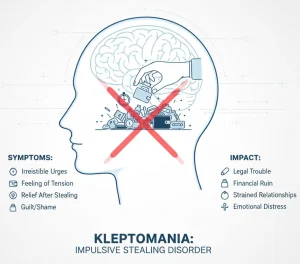Overview
Diagnosis
Diagnosis of kleptomania is based on recognizing behavior patterns and understanding emotional triggers. A physical exam may be done first to rule out medical causes. A psychological evaluation then helps identify symptoms linked to impulse control.
Your mental health provider may:
-
Ask detailed questions about stealing impulses and associated feelings
-
Review situations that may trigger episodes
-
Discuss consequences or problems caused by the behavior
-
Use questionnaires or self-assessment tools
-
Follow DSM-5 guidelines for diagnosing impulse control disorders
A thorough evaluation ensures that kleptomania is accurately identified and that other conditions are ruled out.
Treatment
Kleptomania often requires long-term care, and seeking treatment is essential. Treatment usually involves a combination of psychotherapy, medicines and support strategies. Because there is no single standard treatment, several approaches may be tried to find the most effective plan for you.
Medicines
There is no FDA-approved medicine specifically for kleptomania, but certain medicines may help reduce symptoms or manage related conditions. These may include:
-
Naltrexone to lower urges and reduce the sense of pleasure linked to stealing
-
Selective serotonin reuptake inhibitors (SSRIs) for managing depression or impulse-related symptoms
-
Other psychiatric medicines or combinations, depending on individual needs
Any medicines prescribed should be discussed with your provider to understand possible side effects and interactions.
Psychotherapy
Cognitive behavioral therapy is the most common therapy used for kleptomania. It helps you replace harmful behaviors with healthier responses. Techniques may include:
-
Systematic desensitization and counter-conditioning to manage urges in triggering situations
-
Covert sensitization, visualizing the act of stealing followed by negative consequences
-
Aversion therapy, using mild discomfort techniques when urges arise
Avoiding relapses
Relapses can occur, so following your treatment plan consistently is important. If you feel the urge to steal, contact your mental health provider or reach out to a trusted person or support group for support and guidance.
Advertisement

